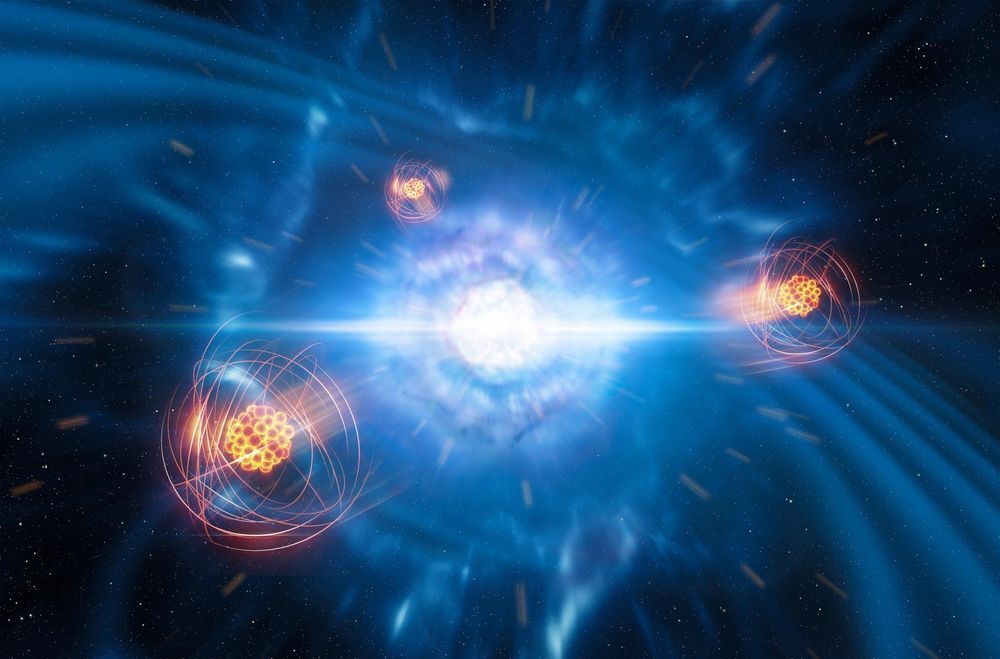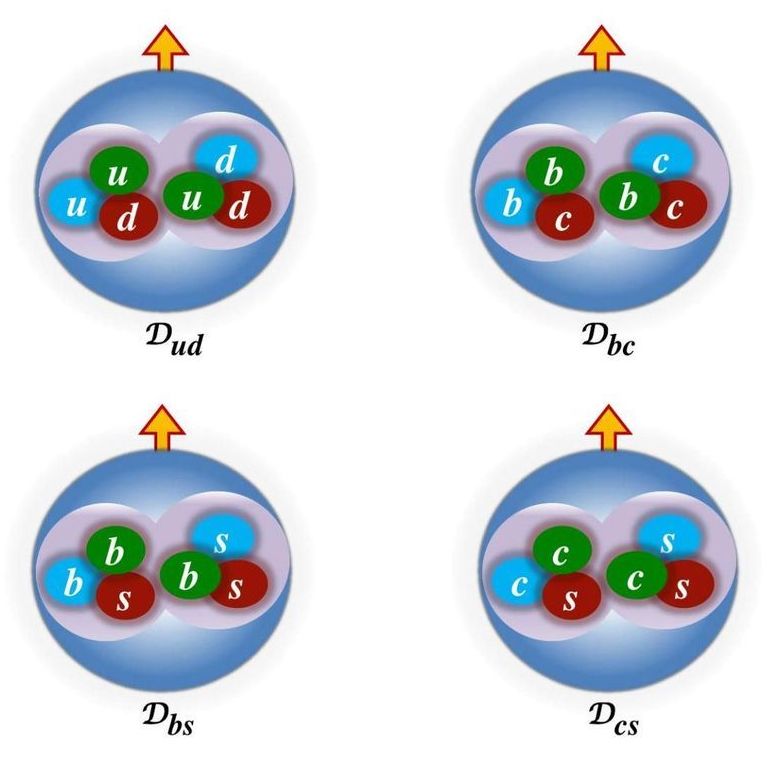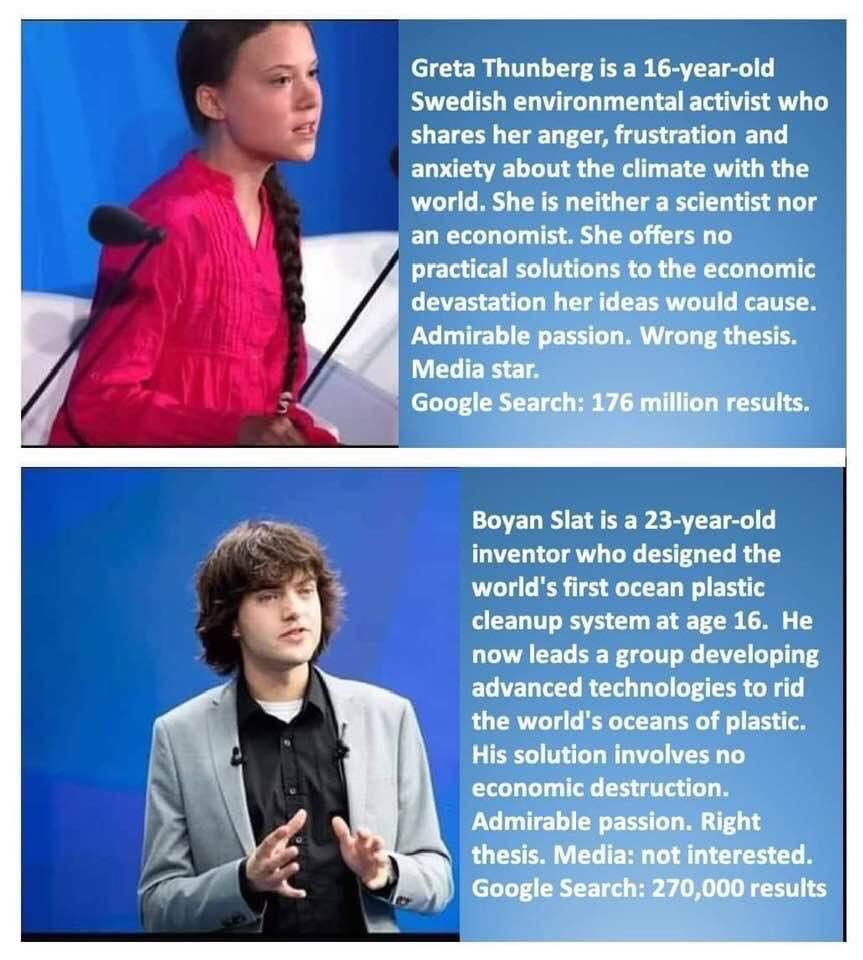Scientists have found changes in the gut microbiomes of vitamin D deficient volunteers after only three sessions of ultraviolet light exposure.



Scientists have found the answer to a decades-long mystery, in the middle of two colliding stars.
For the first ever time, a newly made heavy element called strontium was detected in space after two neutron stars crashed into each other.
The discovery definitively confirms that heavier elements in the universe can be made in the mergers of neutron stars, at last helping answer the puzzle of how chemical elements form.

Have you ever wondered how the Sun creates the energy that we get from it every day and how the other elements besides hydrogen have formed in our universe? Perhaps you know that this is due to fusion reactions where four nuclei of hydrogen join together to produce a helium nucleus. Such nucleosynthesis processes are possible solely due to the existence, in the first place, of stable deuterons, which are made up of a proton and a neutron.
Probing deeper, one finds that a deuteron consists of six light quarks. Interestingly, the strong interaction between quarks, which brings stability to deuterons, also allows for various other six-quark combinations, leading to the possible formation of many other deuteron-like nuclei. However, no such nuclei, though theoretically speculated about and searched for experimentally many times, have yet been observed.
All this may get changed with an exciting new finding, where, using a state-of-the-art first-principles calculation of lattice quantum chromodynamics (QCD), the basic theory of strong interactions, a definite prediction of the existence of other deuteron-like nuclei has been made by TIFR’s physicists. Using the computational facility of the Indian Lattice Gauge Theory Initiative (ILGTI), Prof. Nilmani Mathur and postdoctoral fellow Parikshit Junnarkar in the Department of Theoretical Physics have predicted a set of exotic nuclei, which are not to be found in the Periodic Table. The masses of these new exotic nuclei have also been calculated precisely.
WANT TO SEE MORE?
LIKE & SUBSCRIBE & JOIN OUR DEBT NATION FACEBOOK: https://bit.ly/30yEGGo
WANT TO SEE MORE?
LIKE & SUBSCRIBE & JOIN OUR DEBT NATION YOUTUBE:
HERE: https://bit.ly/2kp4vbB


Neuralink seeks to build a brain-machine interface that would connect human brains with computers. No tests have been performed in humans, but the company hopes to obtain FDA approval and begin human trials in 2020. Musk said the technology essentially provides humans the option of “merging with AI.”
Excellent lecture. Darwin’s turtle, sharks and clams 500 years old, talking about Liz Parrish at an hour and 8. And then a tour.
My mission is to drastically improve your life by helping you break bad habits, build and keep new healthy habits to make you the best version of yourself. I read the books and do all the research and share my findings with you!
This video is DR. BILL ANDREWS PRESENTATION & TOUR OF SIERRA SCIENCES ON OCTOBER 11TH, 2019. Brent Nally recorded, edited and produced this video. My apologies for the poor audio and camera work in the first few minutes. Infinite gratitude to Bill for opening up Sierra Sciences to us. Here’s a link to purchase IsaGenesis. You have to sign up first: https://getstarted.isagenix.com/VF234XXQV001
- Please consider a donation to me: My Bitcoin Cash (BCH) address: qr9gcfv92pzwfwa5hj9sqk3ptcnr5jss2g78n7w6f2 or https://paypal.me/BrentNally
SHOW NOTES:

These days, it seems like every brand is trying to leverage machine learning to imbue their products with special powers — and, most importantly, make an extra buck in the process.
But does your next electric toothbrush really need a dose of AI? Oral-B’s says its new $220 electric toothbrush, called “Oral-B GENIUS X with Artificial Intelligence,” will leverage data from sensors inside the brush head and Bluetooth to deliver AI-derived brushing tips through an app. The future is now, huh?